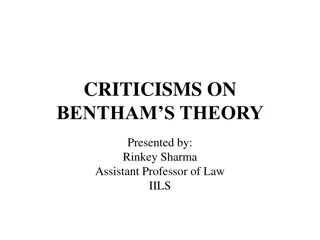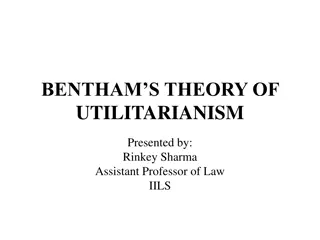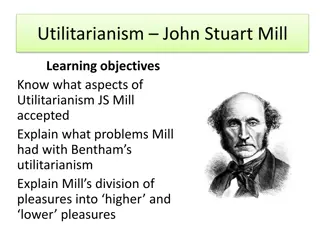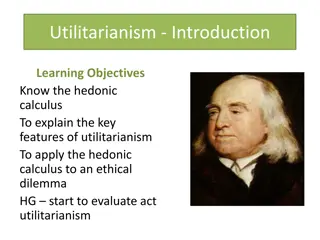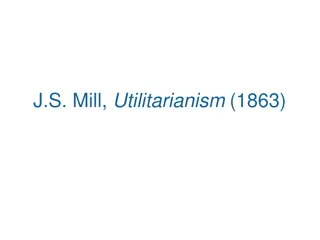Understanding Utilitarianism: Ethics in Public Life Administration
Consequentialist theories in ethics, particularly utilitarianism, emphasize the moral value of actions based on their consequences. Classical utilitarianism by Bentham and Mill focuses on maximizing happiness and pleasure for the greatest number of people. The core principles of utilitarianism include assessing the consequences, promoting utility and pleasure, and prioritizing social happiness. However, challenges arise in determining desired outcomes and the extent of responsibility under utilitarian principles.
Download Presentation

Please find below an Image/Link to download the presentation.
The content on the website is provided AS IS for your information and personal use only. It may not be sold, licensed, or shared on other websites without obtaining consent from the author. Download presentation by click this link. If you encounter any issues during the download, it is possible that the publisher has removed the file from their server.
E N D
Presentation Transcript
Ethics in Public Life Administration in International Organizations 2018 UTILITARIANISM
Consequentialism (utilitarianism)
General description 'Consequentialist theories regard the moral value of actions, rules of conduct, and so on, as dependent on their consequences. [ ] This end, which conveys value to actions and states of affairs, is itself regarded as intrinsically good, good as such, desirable for its own sake.' O. Kuusela, Key Terms in Ethics
Classical utilitarianism of Jeremy Bentham and John Stuart Mill - empirical theory of morality
The Father of the Utilitarianism The Utilitarian philosophy is widely depicted in the opera An Introduction to the Principles of Morals and Legislation (1789). According to Bentham, nature has placed mankind under the governance of two sovereign masters, pain and pleasure. It is for them alone to point out what we ought to do, as well as to determine what we shall do. On the one hand the standard of right and wrong, on the other the chain of causes and effects, are fastened to their throne. They govern us in all we do, in all we say, in all we think . After this introduction he defines the principle of utility as the principle which shall approve or disapprove any action according to its tendency to increase or decrease the amount of happiness of the party whose interest is in question . It is simple to understand what kind of moral doctrine may stem from this principle: an hedonistic one. Thanks to Mattia Aldrovandi, (Administration in International Organizations studies)
Four principles of utilitarianism 1) Principle of consequences Moral value of the act depends solely on expected consequences of this act. 2) Principle of utility When evaluating possible consequences of the act, the criterion is utility - the good that the act brings. 3) Principle of hedonism (pleasure) The good that an act should bring is a pleasure (happiness) 4) Social principle What counts in moral considerations is not only an individual pleasure of an agent, but a happiness of every potentially involved person 'the greatest happiness of the greatest number of people'
Principles of consequences and utility 1. How to calculate desirable and undesirable consequences? 2. Which consequences should we consider? Utilitaranism seems to establish an infinite responsibility
Principle of hedonism Empirical ground for utilitarian ethics How to define a pleasure? A problem of a blank nature of this concept Quantitative vs. qualitative concept of pleasure
The problem of moral horror Act-utilitarianism vs. Rule-utilitarianism
Social Socialreform: reform: Panopticon, or the Inspection House Panopticon, or the Inspection House THE HISTORICAL AND PHILOSOPHICAL BACKGROUND England towards the end of the XVIII century: the number of poor people and of criminals is steadily increasing. England urgently needed a social reform able to restore order. Bentham came up with a solution in the form of an architectonic building that he called Panopticon. The Panopticon, as we will see, is not only the answer to a specific question (namely the English prison system crisis), but the result of years of philosophical and sociological studies and the only means by which we will build an orderly and peaceful utilitarian society (conditio sine qua non for the achievement of the greatest happiness). This and subsequent slides: Thanks to Mattia Aldrovandi, (Administration in International Organizations studies)
The work Panopticon; or the Inspection House was published in 1791. The Panopticon is the project of a prison, but for Bentham it is something more. The philosophical implications and the several applications of the Panopticon are the pillars on which the reform of the society (in an utilitarian sense) shall start: 'Morals reformed health preserved industry invigorated instruction diffused public burthens lightened Economy seated, as it were, upon a rock the gordian knot of the Poor-Laws not cut, but untied all by a simple idea in Architecture!
THE STRUCTURE The scheme of the design is to allow all (pan-) inmates of an institution to be observed (- opticon) by a single watchman without the inmates being able to tell whether or not they are being watched. Although it is physically impossible for the single watchman to observe all the inmates' cells at once, the fact that the inmates cannot know when they are being watched means that they are incentivized to act as though they are being watched at all times. This scheme effectively compels the inmates to constantly control their own behavior: this is called the central inspection principle.
The design consists of a circular structure with an "inspection house" at its centre, from which the manager or staff of the institution is able to watch the inmates. The inmates, who are stationed around the perimeter of the structure, are unable to see through their cells. Bentham conceived the basic plan as being equally applicable to hospitals, schools, sanatoriums, and asylums, but he devoted most of his efforts to developing a design for a Panopticon prison.
Apart from the constant surveillance, other fundamental elements of the Panopticon system were: The Panoptic system could seem to be unmoral and inhuman, but every measure and every arrangement was taken in order to built an utilitarian society. Some could say this project will transform people in automatons, then Bentham answers: 1. the harsh discipline (strictly organized timetable, obligatory education and inculcation of etiquette, particular type of clothes) in order to create persons well suited to live in the society; 2. forced work in order to make prisoners used to make a living in a honest way; 3. a temporary or permanent mark depending on the committed crime. "Call them soldiers, call them monks, call them machines: so they were but happy ones, I should The ultima goal of Bentham was to create a new type of utilitarian man fit for living in an utilitarian society. For this reason he wanted to apply the panoptic system to every layer of the society. not care."





